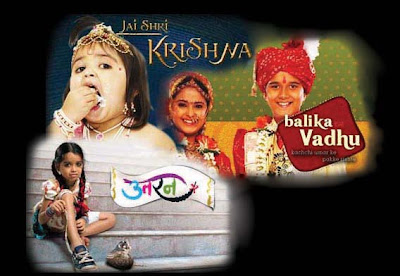
‘Knee-high protagonists of shows like Uttaran and Balika Vadhu continue to be TRP grabbers’ Calcutta Times, Tuesday, January 6, 2009.
I would like to add one more daily series here, Jai Sri Krishna (Victory of Lord Krishna!). It also has a little protagonist Krishna whose accretion even has been delayed for grabbing TRPs. Even the viewers, who don’t like the soap, like the little adorable child in the role of Krishna. So, here Krishna may grow up in real time rather than screen time (at least something realistic!). The very talented Avika Gor (Anandi), leading Balika Vadhu (Child Bride), and the brilliant actress Sparsh khanchandani (Ichcha) of Uttaran (hand-me-down) also have propagated themselves in primetime slots by their very natural and influential acting.
Therefore, it is now persuaded that ‘India television is riding high on these little shoulders’. We have seen how cute babies can quickly popularize a TV commercial. Thus, this is not a very out of the box concept of giving hits for the creative behind the camera. To them it is another hit formula like saas-bahu. Then, is this the next for Indian TV after saas-bahu saga? Is that all the mature Indian audience deserve? Here one important point I want to bring up that Balika Vadhu is creating history in terms of TRPs. This series is more popular than the other two. All the three have talented, cute and adorable children, then why Balika Vadhu? Here leaves my argument, knee-highs are not the only thing which popularizes these soaps or I can say the secret of the triumph of Balika Vadhu can tell what exactly is liked by the viewers and what exactly the future of Indian TV drama is.
Balika Vadhu is a story of a child bride Anandi. The plot is based on a village of Rajasthan. Like other daily soaps place (Rajasthan) is not just an information here. In every moment of the episodes one can feel the flavor of Rajasthan. From the dialect, consumes, sets, ambiance, rituals, thought process everything is bearing Rajasthan. If we remember Kasauti Jindegi ki, they had introduced that series in a Bengali plot but after some episodes they forgot all about the Bengali quintessence. Though the characters occasionally wore Sanjay Vansali version of Bengali shares!
To sum up, I can say saas-bahu, small cute children these are only the ‘changing themes’. The future of Indian TV drama is laying somewhere else. A more detailed and realistic approach and the psycho analysis of the characters; these are what modern spectator deserves and the key to excel and sustain on primetime in the long run.
1 comment:
Palatable produce served with great consumer-insight over the knee height!
Post a Comment